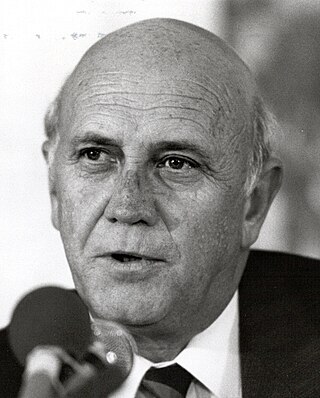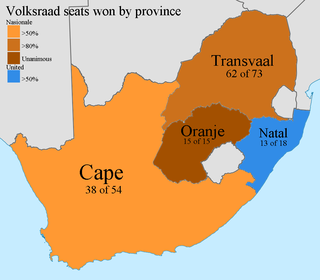
Politics of the Democratic Republic of Congo take place in a framework of a republic in transition from a civil war to a semi-presidential republic.
The Republic of South Africa is a unitary parliamentary democratic republic. The President of South Africa serves both as head of state and as head of government. The President is elected by the National Assembly and must retain the confidence of the Assembly in order to remain in office. South Africans also elect provincial legislatures which govern each of the country's nine provinces.
The politics of Tanzania takes place in a framework of a unitary presidential democratic republic, whereby the President of Tanzania is both head of state and head of government, and of a multi-party system. Executive power is exercised by the government. Legislative power is vested in both the government and parliament. The party system is dominated by the Chama Cha Mapinduzi. The Judiciary is independent of the executive and the legislature.
A member of parliament (MP) is the representative in parliament of the people who live in their electoral district. In many countries with bicameral parliaments, this term refers only to members of the lower house since upper house members often have a different title. The terms congressman/congresswoman or deputy are equivalent terms used in other jurisdictions. The term parliamentarian is also sometimes used for members of parliament, but this may also be used to refer to unelected government officials with specific roles in a parliament and other expert advisers on parliamentary procedure such as the Senate Parliamentarian in the United States. The term is also used to the characteristic of performing the duties of a member of a legislature, for example: "The two party leaders often disagreed on issues, but both were excellent parliamentarians and cooperated to get many good things done."

The Parliament of the Republic of South Africa is South Africa's legislature; under the present Constitution of South Africa, the bicameral Parliament comprises a National Assembly and a National Council of Provinces. The current twenty-seventh Parliament was first convened on 22 May 2019.

General elections were held in South Africa between 26 and 29 April 1994. The elections were the first in which citizens of all races were allowed to take part, and were therefore also the first held with universal suffrage. The election was conducted under the direction of the Independent Electoral Commission (IEC), and marked the culmination of the four-year process that ended apartheid.

Elections in Botswana take place within the framework of a multi-party democracy and a parliamentary system. The National Assembly is mostly directly elected, and in turn elects the President and some of its own members. The Ntlo ya Dikgosi is a mixture of appointed, hereditary and indirectly elected members.

Elections in the Comoros take place within the framework of a multi-party democracy and a presidential system. The President and the majority of the seats in the Assembly of the Union are directly elected.

There are three types of elections in Nepal: elections to the Federal Parliament, elections to the provincial assemblies and elections to the local government. Within each of these categories there may be by-elections as well as general elections. Currently three electoral systems are used: parallel voting for House of Representatives and provincial assemblies, Single transferable vote for National Assembly and first past the post for local elections.

The National Assembly is the directly elected house of the Parliament of South Africa, located in Cape Town, Western Cape. It consists of four hundred members who are elected every five years using a party-list proportional representation system where half of the members are elected proportionally from nine provincial lists and the remaining half from national lists so as to restore proportionality.

Elections in Kenya take place within the framework of a multi-party democracy and a presidential system. The President, Senate and National Assembly are directly elected by voters, with elections organised by the Independent Electoral and Boundaries Commission (IEBC).
The Senate was the upper house of the Parliament of South Africa between 1910 and its abolition from 1 January 1981, and between 1994 and 1997.

The National Assembly of People's Power is the unicameral parliament of the Republic of Cuba. It is currently composed of 605 representatives who are elected from multi-member electoral districts for a term of five years. The current President of the Assembly is Esteban Lazo Hernández. The Assembly only meets twice a year, with the 31-member Council of State exercising legislative power throughout the rest of the year. The most recent elections were held on 26 March 2023. As of April 2023, the number of representatives is 470.

Parliamentary life in Egypt has been a mark of Egyptian civilizations along its history. In modern history, parliamentary life started as early as 1824 while representative parliamentary life did not start until 1866. In 2016, Egypt celebrated the 150th anniversary of Parliamentary life in their country.

The National Assembly is the legislative branch of the government of Angola. Angola is a unicameral country so the National Assembly is the only legislative chamber at the national level.

General elections were held in South Africa on 30 March 1966. The result was another comprehensive victory for the National Party under Hendrik Frensch Verwoerd.

General elections were held in South Africa on 18 May 1938 to elect the 150 members of the House of Assembly. The United Party won an absolute majority.

The Tricameral Parliament, officially the Parliament of the Republic of South Africa, was the legislature of South Africa between 1984 and 1994, established by the South African Constitution of 1983, which gave a limited political voice to the country's Coloured and Indian population groups. The majority Black population group was however still excluded, their interests notionally represented in the governments of the black homelands, or "bantustans", of which they were formally citizens. As these institutions were largely politically impotent, its principal effect was to further entrench the political power of the White section of the South African population.

The Constitution of 1961 was the fundamental law of South Africa for two decades. Under the terms of the constitution South Africa left the Commonwealth and became a republic.

Parliamentary elections were held in Seychelles from 8 to 10 September 2016. Three parties and three independent candidates ran for the 25 directly-elected seats. The result was a victory for the opposition Linyon Demokratik Seselwa alliance, which won 19 of the 33 seats. It was the first time since the 1979 elections that the People's Party did not win a majority of seats.
















